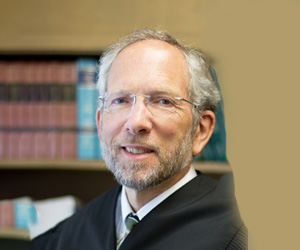Get to Know Presiding Judge Ed Weil
 It’s an honor to have been selected by my colleagues as Assistant Presiding Judge, and now as Presiding Judge for 2023 and 2024. My colleagues also have selected our incoming Assistant Presiding Judge, Christopher Bowen, who will become Presiding Judge in 2025 and 2026.
It’s an honor to have been selected by my colleagues as Assistant Presiding Judge, and now as Presiding Judge for 2023 and 2024. My colleagues also have selected our incoming Assistant Presiding Judge, Christopher Bowen, who will become Presiding Judge in 2025 and 2026.
The last two years have posed many challenges, and we owe a great debt to Presiding Judge Rebecca Hardie, who deftly guided the court through her two-year term, which occurred entirely during the COVID pandemic. This required careful adherence to the directives of the local health department and the CDC, as well as development of new procedures and methods for assuring public access to the court. Because we were able to keep the court open and functioning, as we return to something more “normal,” the back-up of justice delayed is much smaller than it otherwise might have been.
The silver lining to this cloud is that the court has vastly increased its use of remote technology in case management conferences, hearings, and even trials. We won’t completely return to pre-pandemic procedures. Use of remote technology has not only kept us healthier, but has enabled counsel and litigants to much more efficiently argue and participate in their cases. Most recently, courtrooms are being better equipped to handle “hybrid” hearings, i.e., those in which some participants are in the courtroom while others participate by remote technology, with those people able to see the judge, witness, and attorneys.
Another accomplishment of Judge Hardie and our great Court Executive Officer, Kate Bieker, is the implementation of the Odyssey case management system, which has brought electronic filing to our county and is resulting in a paperless court system.
And it goes without saying (although I’ll say it anyway) that none of this could have been done without the extraordinary effort of our dedicated court staff. They have been on the front lines of procedural changes during the pandemic. They have learned how to operate the new courtroom technology. They have learned the Odyssey system, which, while it ultimately will free them from handling paperwork, has required extensive training and learning. Kudos to all of them!
The past year has seen the retirement of Judges Barry Baskin, Anita Santos, Terry Canepa, Judy Johnson, and Steve Austin. All great losses to the court! As a result, we currently have five vacancies among 38 authorized positions. It was six vacancies, but on October 7, the Governor announced the appointment of one of our current Commissioners, Ayana Young. We’re incredibly pleased to have her, and she will immediately tackle her assignment in the Family Law Division. Still, because we have several vacancies, and expect more next year, we will have to strive mightily to continue to provide access to justice.
In October, Governor Newsom signed judicial pension reform legislation, which will ease the previously very strict “cliff vesting” provision of the judicial retirement system, which required judges to remain on the bench until at least age 65, and often 70. This will take effect in 2024, and may result in more judicial retirements. We expect that our county will continue to have an outstanding and diverse bench.
My background? Having now been a judge for thirteen years, I have held a variety of assignments. After an initial stint in the old Pittsburg courthouse in 2009, I served in Richmond from 2010 through 2012, the last year as Supervising Judge. I then served in Family law from 2013 through 2015, again serving as Supervising Judge in the last year. In 2016, I moved to an assignment of civil litigation half-time and Probate cases half-time. This included the LPS calendar as well as probate trials sent to me by the main probate department, then heard by Judge Sugiyama. Throwing in an occasional criminal trial, it was an assignment with a lot of variety. In May of 2018, with the retirement of Judge Barry Goode, I took over the Complex Litigation Department, which consists primarily of cases designated as complex under the rules of Court: class actions, wage & hour cases, construction defect cases, and environmental cases. For most of this time, I also served on the court’s Appellate Division, which hears appeals in misdemeanor and limited jurisdiction matters.
Before my appointment by Governor Schwarzenegger, I worked for the State Attorney General’s Office for 21 years, all in the Environment Section, litigating civil matters enforcing environmental laws. Before that, I spent four years at what was then known as San Francisco Neighborhood Legal Assistance Foundation (now part of Bay Area Legal Aid). From 1980 to 1984, I worked in Washington, D.C., for the U.S Department of Housing and Urban Development.
My higher education all came from the University of California Berkeley, where I obtained a Bachelor’s Degree in Political Science (with Honors in the Major and Distinction in General Scholarship), class of ’76, my law degree (’79) and a Master’s Degree in City & Regional Planning (’80).
I live with my wonderful wife Maureen. I have two adult children, and recently became a grandfather for the first time.